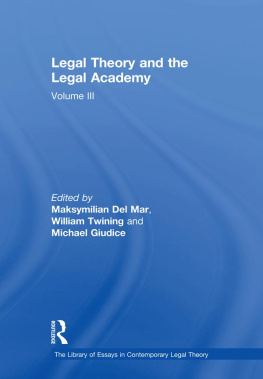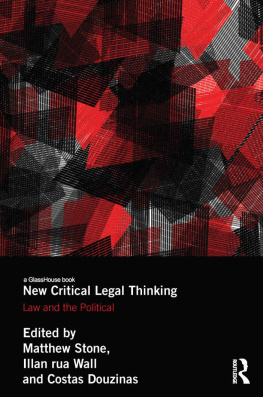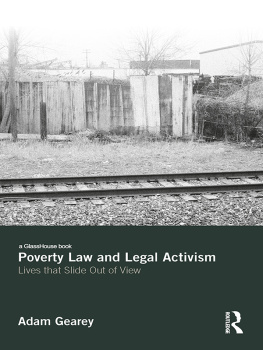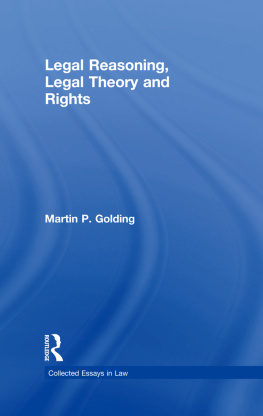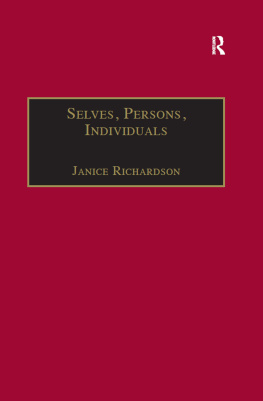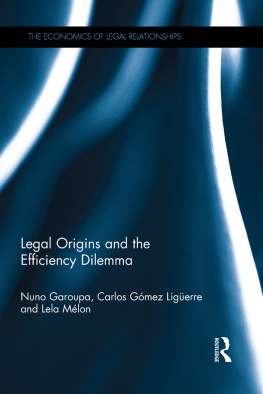The Library of Essays in Contemporary Legal Theory
Titles in the Series:
The Methodology of Legal Theory
Volume I
Michael Giudice, Wil Waluchow and
Maksymilian Del Mar
Legal Theory and the Social Sciences
Volume II
Maksymilian Del Mar and Michael Giudice
Legal Theory and the Legal Academy
Volume III
Maksymilian Del Mar, William Twining and
Michael Giudice
First published 2010 by Ashgate Publishing
Published 2016 by Routledge
2 Park Square, Milton Park, Abingdon, Oxon OX14 4RN
711 Third Avenue, New York, NY 10017, USA
Routledge is an imprint of the Taylor & Francis Group, an informa business
Copyright Maksymilian Del Mar, William Twining and Michael Giudice 2010. For copyright of individual articles please refer to the Acknowledgements.
All rights reserved. No part of this book may be reprinted or reproduced or utilised in any form or by any electronic, mechanical, or other means, now known or hereafter invented, including photocopying and recording, or in any information storage or retrieval system, without permission in writing from the publishers.
Notice:
Product or corporate names may be trademarks or registered trademarks, and are used only for identification and explanation without intent to infringe.
Wherever possible, these reprints are made from a copy of the original printing, but these can themselves be of very variable quality. Whilst the publisher has made every effort to ensure the quality of the reprint, some variability may inevitably remain.
British Library Cataloguing in Publication Data:
Legal theory and the legal academy. (The library of essays in contemporary legal theory)
1. JurisprudenceStudy and teaching. 2. Comparative law Philosophy.
I. Series II. Del Mar, Maksymilian, 1979 III. Twining, William L. IV. Giudice, Michael.
340.0711dc22
Library of Congress Control Number: 2010926291
ISBN 9780754628880 (hbk)
The editor and publishers wish to thank the following for permission to use copyright material.
The American Journal of Comparative Law for the essays: William Ewald (1998), The Jurisprudential Approach to Comparative Law: A Field Guide to Rats, American Journal of Comparative Law, 47, pp. 701707. Copyright 1998 William Ewald; Catherine Valcke (2004), Comparative Law as Comparative JurisprudenceThe Comparability of Legal Systems, American Journal of Comparative Law, , pp. 71340. Copyright 2004 Catherine Valcke.
Cambridge University Press for the essays: Mark Van Hoecke and Mark Warrington (1998), Legal Cultures, Legal Paradigms and Legal Doctrine: Towards a New Model for Comparative Law, International and Comparative Law Quarterly, , pp. 495536. Copyright 1998 Cambridge University Press; Geoffrey Samuel (1998), Comparative Law and Jurisprudence, International and Comparative Law Quarterly, , pp. 81736. Copyright 1998 Cambridge University Press.
Hart Publishing for the essay: William Twining (2009), Implications of Globalisation for Law as a Discipline, in A. Halpin and V. Roeben (eds), Theorising the Global Legal Order, Oxford: Hart Publishing, pp. 3960. Copyright 2009 Hart Publishing.
Harvard International Law Journal for the essay: Gnter Frankenberg (1985), Critical Comparisons: Re-thinking Comparative Law, Harvard International Law Journal, , pp. 41155. Copyright 1985 Harvard International Law Journal.
Journal of Legal Education for the essay: Patricia A. Cain (1988), Teaching Feminist Legal Theory at Texas: Listening to Difference and Exploring Connections, Journal of Legal Education, , pp. 16581. Copyright 1988 Journal of Legal Education.
Oxford University Press for the essay: Mathias M. Siems (2008), Legal Originality, Oxford Journal of Legal Studies, , pp. 14764. Copyright 2008 Oxford University Press.
Taylor and Francis for the essays: Roger Cotterrell (2000), Pandoras Box: Jurisprudence in Legal Education, International Journal of the Legal Profession, , pp. 17987. Copyright 2000 Taylor and Francis Ltd; Seow Hon Tan (2009), Teaching Legal Ideals through Jurisprudence, Law Teacher, , pp. 1436. Copyright 2009 Seow Hon Tan; Andrew Halpin (2000), Law, Theory and Practice: Conflicting Perspectives?, International Journal of the Legal Profession, , pp. 20523. Copyright 2000 Taylor and Francis Ltd.
John Wiley and Sons for the essays: Hilaire Barnett (1995), The Province of Jurisprudence DeterminedAgain!, Legal Studies, , pp. 88127. Copyright 1995 John Wiley and Sons; Neil MacCormick (1985), The Democratic Intellect and the Law, Legal Studies, , pp. 17283. Copyright 1995 John Wiley and Sons; Alan Hunt (1989), The Role and Place of Theory in Legal Education: Reflections on Foundationalism, Legal Studies, , pp. 14664. Copyright 1989 John Wiley and Sons; Neil MacCormick (1989), The Ethics of Legalism, Ratio Juris, , pp. 18493. Copyright 1989 Neil MacCormick; Mark Van Hoecke and Franois Ost (1993), Epistemological Perspectives in Legal Theory, Ratio Juris, , pp. 3047. Copyright 1993 Basil Blackwell Ltd.
Every effort has been made to trace all the copyright holders, but if any have been inadvertently overlooked the publishers will be pleased to make the necessary arrangement at the first opportunity.
Contemporary Legal Theory
The last thirty years have witnessed a proliferation of theorising about law, as well as reflection on the very practice of that theorising. As the discipline of legal theory has flourished, so have methodological debates and controversies. These debates are not only relevant to how legal theory understands its own enterprise: its problems and aims, and issues of scope. They are also relevant to many other aspects of the practice of legal theory, and its role vis--vis the practice of law and the practice of other related activities, such as legal scholarship and legal education. Further, as the ambitions of legal theory grow, so do questions concerning its relations with other disciplines, such as comparative law, but also, much more broadly, the social sciences.
This three volume series on Contemporary Legal Theory aims to track and project the relations between legal theory and related disciplines. Accordingly, the first volume is devoted to preparing the way, by assembling recent work on the methodology of legal theory. It examines the problems and aims of legal theory, issues of semantics and epistemology, perspectives on morality in the theory of law and issues of scope.
The second volume follows naturally from where the first volume ends, and takes up issues to do with mapping the intersections between legal theory and the social sciences. It is divided into three parts: first, it looks at methodological disputes and collaboration; second, it considers how both legal theory and the social sciences employ a variety of different modes of explanation of behaviour, and the role that these modes play in the construction of theories about law; and third, it surveys how both legal theory and the social sciences might work together to portray legal phenomena, especially insofar as one sets out to study the language of law in its social context as well as the place of laws within a broader context of normative phenomena.

